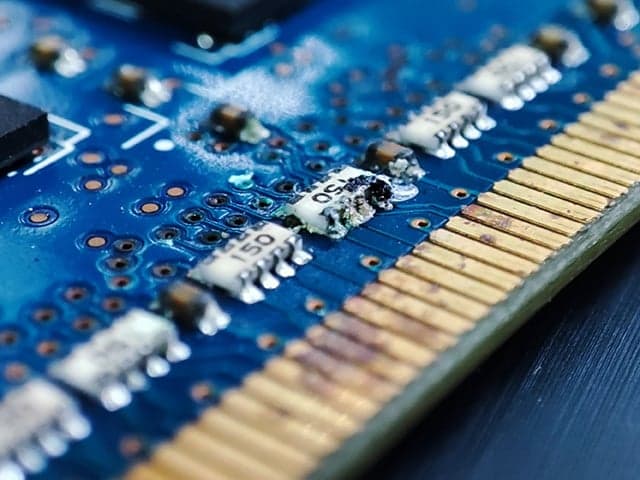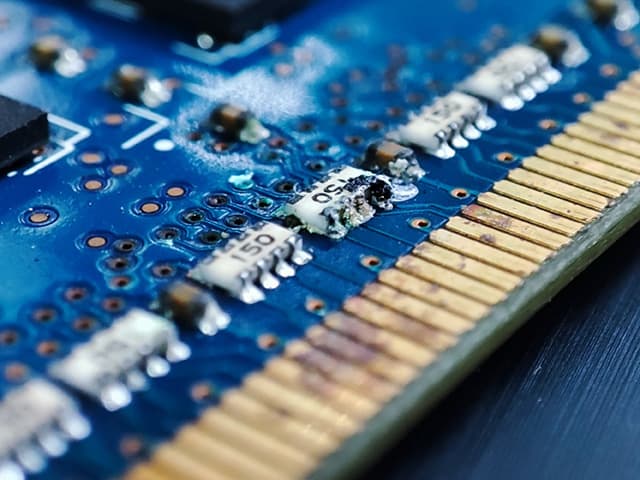Electrochemical Migration (ECM) Testing
Protect your printed circuit boards from costly field failures with Element's comprehensive ECM testing services. Our expert evaluation detects potential metallic ion migration and dendritic growth issues before they cause shorts, while our experienced laboratory team provides thorough root-cause analysis for existing failures. With over 30 years of experience in electrochemical migration testing, we can help you prevent failures and ensure reliable performance.

What is Electrochemical Migration (ECM) Testing at Element?
ECM testing evaluates your circuit boards' cleanliness and assesses the risk of dendritic growth-related failures. Electrochemical migration testing may also be used to assess a soldering product’s propensity to contribute to the development of leakage current across electrically isolated circuits. At Element, we analyze how voltage and humidity conditions affect metal ion migration between isolated conductors, helping prevent shorts and ensure product reliability through preventative approaches.

What can Element offer you for Electrochemical Migration (ECM) Testing?
Components and materials we test
Components and materials we test
Element test completed printed circuit assemblies, soldering products, and related components for their susceptibility to electrochemical migration. Our testing evaluates the cleanliness of circuit boards and assesses how soldering products might contribute to the development of leakage current across electrically isolated circuits.
Key tests offered
Key tests offered
At Element, we provide comprehensive ECM testing services including preventative evaluation, root cause failure analysis, and assessment of cleaning processes. We develop, perform, and interpret ECM testing based on your specific requirements.
Which labs offer this service
Which labs offer this service
Notably among our global network of circuit board testing labs, our Anaheim, CA and Baltimore, MD labs, formerly known as Microtek and Trace Labs, have more than 30 years of experience partnering with leading OEMs and manufacturers for printed circuit board testing. See all our labs on our locations page.
Standards we test to and materials we test
- Completed printed circuit assemblies
- Flux-containing solders
- Solder masks
- Printed circuit boards
- Soldering pastes
- Fluxes
- PCB components
- PCB assemblies
- Electrical device components
Your Challenges, Our Solutions
Difficult-to-Diagnose Field Failures
Quality Assurance Concerns
Time-to-Market Pressures
Complicated Outsourcing
Why Choose Element

Global Expertise Network
Proven Track Record
Comprehensive Solutions
Prevention-First Approach
Frequently asked questions
What causes electrochemical migration in circuit boards?
Applied voltage and humidity can cause metal ions to migrate between isolated conductors on a completed printed circuit assembly, creating metallic filaments called dendrites that cause electrical shorts. When a board surface is littered with ions, shorts become more likely, and a product may fail as a result.
How do dendrites affect PCB performance?
Dendrites are fragile with low current carrying capacity, forming and disappearing repeatedly to cause intermittent failures that are difficult to diagnose. ECM testing evaluates the cleanliness of your circuit boards and their likelihood to fail due to shorts caused by dendritic growth.

Explore our global network of labs and find your nearest location
VIEW ALL LOCATIONSRelated services

Printed Circuit Board (PCB) Testing
Looking for reliable printed circuit board testing? Element ensures PCB and assembly quality with advanced HATS2â„¢, counterfeit detection, and compliance. Learn More.

Printed Circuit Board (PCB) Failure Analysis
Understand and rectify the root causes of PCB failure with industry-leading PCB failure analysis from the testing experts at Element. Optimize your PCB designs while managing costs. Learn More.

Conductive Anodic Filament (CAF) Testing
Conductive Anodic Filament (CAF) testing by Element ensures PCB reliability to IPC-TM-650. Prevent shorting failures, meet IPC standards and OEM specifications. Learn More.

Surface Insulation Resistance (SIR) Testing
Measure the reliability of your printed circuit boards under real-world temperature and humidity conditions with surface insulation resistance (SIR) testing from Element.
